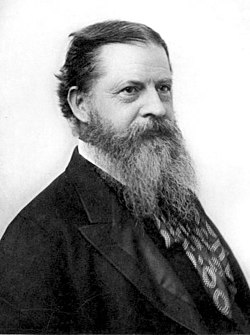| Part of a series on |
| Charles Sanders Peirce |
|---|
 |
| Pragmatism in epistemology |
| Logic |
| Semiotic theory |
| Miscellaneous contributions |
| Biographical |
Synechism (from Greek συνεχής synechḗs, "continuous" + -ism, from σύν syn, "together" + ἔχειν échein>, "to have", "to hold"), a philosophical term proposed by C. S. Peirce[1] to express the tendency to regard things such as space, time, and law as continuous:[2]
The things of this world, that seem so transitory to philosophers, are not continuous. They are composed of discrete atoms, no doubt Boscovichian points. The really continuous things, Space, and Time, and Law, are eternal.
His synechism holds that the essential feature in philosophic speculation is continuity. It denies that all is merely ideas, likewise that all is merely matter, and mind–matter dualism.
The adjective "synechological" is used in the same general sense; "synechology" is a theory of continuity or universal causation; "synechia" is a term in ophthalmology for a morbid union of parts.